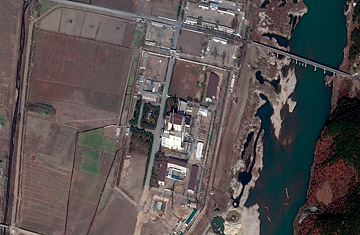
A DigitalGlobe Satellite image shows construction at North Korea's Yongbyon nuclear complex on Nov. 4, 2010
"This is not a crisis," said Stephen Bosworth, President Obama's special envoy to North Korea, speaking to reporters in Seoul on Monday after meeting with his South Korean counterparts to discuss the latest public revelation of just how advanced Pyongyang's nuclear program is. "We are not surprised."
Set aside for the moment that Bosworth evidently had his weekend plans disrupted by the sudden trip to East Asia to consult with countries in the region about this noncrisis. In a sense, he's right. The disclosure in a Nov. 20 report by Siegfried Hecker, former director of Los Alamos National Labs in the U.S., that the North had given him and two colleagues a recent peek at a new, "ultra modern" facility replete with "hundreds and hundreds" of centrifuges at a site that did not exist 18 months ago is the latest in a long line of evidence that North Korea seeks to increase the numbers of bombs it possesses and to produce them in the two ways in which it is possible: obtaining plutonium from the spent fuel produced by a nuclear reactor — which the North has already done at Yongbyon, 60 miles north of Pyongyang — and enriching uranium to weapons grade, which is why the brand-new centrifuges are spinning in a building right next door to the reactor.
The question for the Obama Administration now is the same one that confronted President Obama when he came into office, and the same one that confronted his two predecessors: What are you going to do about it? Obama began his presidency firmly in the pro-engagement camp — those in the U.S. foreign policy establishment who believe that Bill Clinton proved way back in 1994 that the right array of carrots and sticks can get Pyongyang to agree to a deal to give up its nuclear ambitions. (It's an ironic footnote to the tortuous diplomatic history with North Korea that this is the same camp that believes the Bush Administration erred profoundly by confronting Pyongyang directly on Oct. 3, 2002, about intelligence it had on the regime's secret uranium-enrichment program, and then leaking it to the press. The North admitted it, flipped Bush the diplomatic bird, and went on its merry way increasing its nuclear arsenal. It now has, according to U.S. intelligence estimates, 8 to 12 bombs made from spent fuel produced at the Yongbyon reactor.)
The Obama team came in, as one senior diplomat puts it, "trying to extend a hand" to North Korea, hoping to re-energize the nuclear diplomacy that had again stalled after another push during Bush's second term. But after less than a year in office, not only had the North not responded to Obama's effort to change the atmospherics, it "had bitten our outstretched hand," says the diplomat. Ever since, the Administration's position has been that only when the North takes steps toward getting rid of its nukes will the U.S. re-engage the so-called six-party nuclear talks (which include South Korea, Japan, Russia and China). They're obviously still waiting.
Bosworth will arrive in Beijing on Tuesday morning for talks with his Chinese counterparts. Admiral Mike Mullen, chairman of the U.S. Joint Chiefs of Staff, said on Sunday that — as usual — much depended on the pressure China could bring to bear on North Korean leader Kim Jong Il. He said Beijing "would have an awful lot to do" with any efforts going forward to get the North to stand down its nuclear program. Diplomatic sources, in fact, say Obama raised the issue of the North's uranium-enrichment program at a Nov. 11 meeting with Chinese President Hu Jintao at the G-20 in Seoul.
The only problem is that, over the years, Beijing has made clear through its relative inaction that it doesn't appear overly concerned with North Korea being a nuclear power. Furthermore, there is no evidence that China, by far North Korea's largest trading partner, will allow sanctions that could seriously harm the North Korean regime. (Indeed, the sanctions enacted to date against North Korea have obviously not deterred the regime from pursuing a uranium-based path to more nukes.) Failing Beijing cracking economic heads in Pyongyang, it's simply never been clear what other diplomatic sticks could be brought to bear that would get Kim's attention.
Bosworth insisted after talks in Seoul on Monday that the U.S. policy toward the North and its nuclear program was "not a failure." But he added that it's possible that the U.S. and its partners might "refine" their approach. It's conceivable that Beijing will urge the U.S., South Korea and Japan to drop their collective stance that the North must take steps toward denuclearization before negotiations can commence again. China may even urge the U.S., as it has in the past, to talk directly with Pyongyang, with an emphasis on carrots (cash, food, fuel and diplomatic recognition), not sticks.
It's hard to see that flying in today's Washington. The Administration more likely may focus on the pointed question Hecker raised in his report on his trip to Yongbyon: "How did North Korea acquire centrifuge technology at such a level of sophistication, and when?" In the past, the North has dealt with AQ Khan's infamous nuclear network and has also worked with Iran and Syria, as well as an unknown number of private-sector suppliers of "dual use" technology. Since at least Sept. 12, 2001, it's been an urgent priority of both the U.S. and the United Nations to crack down on the international trade in technology that helps produce weapons of mass destruction. To say the very least, Kim Jong Il's possession of an "ultra modern" uranium-enrichment facility raises questions about just how effective that crackdown has been.
— With reporting by Stephen Kim / Seoul
